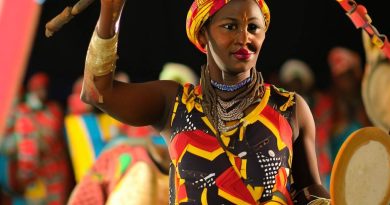The Evolving Soundscape of Nigeria: A DJ’s Perspective
Last Updated on January 26, 2024
Introduction
A. The Evolving Soundscape of Nigeria
Nigeria’s music scene is constantly changing, reflecting its rich cultural diversity and vibrant energy.
B. The DJ’s Unique Perspective
As key players in this musical evolution, DJs hold the power to shape trends, introduce new genres, and inspire artists.
C. Thesis Statement
This section explores how Nigerian DJs are driving the transformation of the country’s music landscape, molding it into a global force.
Historical Background of Nigerian Music
A. Traditional Nigerian Music and Its Cultural Significance
- Nigerian traditional music holds deep cultural significance, representing the country’s diverse ethnic groups.
- Traditional music often accompanies rituals and ceremonies, serving to connect people with their ancestral roots.
- Different regions in Nigeria have unique musical styles, instruments, and dance forms that vary widely.
- The use of traditional Nigerian music helps to preserve cultural heritage and promote a sense of identity.
- Traditional rhythms, melodies, and lyrics reflect the daily lives, beliefs, and experiences of the Nigerian people.
B. Influence of Western Musical Styles on Nigerian Music
- The introduction of Western musical styles to Nigeria began during colonization in the late 19th century.
- Christian missionaries brought hymns and choral music, which influenced the development of Nigerian gospel music.
- Nigerian sailors and immigrants exposed to Western popular music in the early 20th century incorporated these styles into their own music.
- Highlife music emerged as a fusion of traditional Nigerian rhythms with Western jazz, swing, and calypso.
- Western instruments like guitars, pianos, and brass became popular and were integrated into Nigerian music.
C. Emergence of New Genres and Subgenres
- In the 1960s, Nigerian artists embraced Afrobeat, a genre pioneered by Fela Kuti, blending jazz, funk, and traditional rhythms.
- Juju music, led by artists like King Sunny Ade, combined traditional Yoruba music with Western influences, creating a lively and danceable sound.
- The 1990s saw the rise of Nigerian hip-hop, heavily influenced by American rap music and addressing social and political issues.
- Afro-pop, a fusion of Nigerian highlife and Western pop music, gained popularity globally in the late 20th century.
- Contemporary Nigerian music is characterized by an eclectic mix of genres, incorporating elements from Afrobeat, hip-hop, R&B, reggae, and traditional styles.
In short, Nigerian music has a rich and diverse history. Traditional music serves as a cultural bridge, connecting Nigerian people to their heritage.
The influence of Western musical styles has contributed to the evolution of new genres and subgenres that have gained national and international recognition.
Nigerian music continues to evolve, reflecting the country’s dynamic cultural landscape and influencing the global music scene.
Read: Key Skills for Success in Nigerian Songwriting
The Rise of Afrobeat and its Impact
A. Afrobeat and its origins in Nigeria
Afrobeat is a genre of music that originated in Nigeria, characterized by a fusion of traditional Nigerian music and Western influences.
B. Contributions of Fela Kuti and his influence on Nigerian music
- Fela Kuti, a legendary Nigerian musician, is often credited as the pioneer of Afrobeat.
- He blended elements of jazz, funk, and highlife with traditional Yoruba music to create a unique sound.
- Fela Kuti’s influence on Nigerian music cannot be overstated.
- He used his music as a powerful tool for political activism, addressing social and political issues in his lyrics.
- Fela Kuti’s music had a significant impact on Nigerian society, inspiring a new generation of musicians to use their art as a means of social commentary and activism.
C. Analyze the global success and recognition of Afrobeat
- The global success of Afrobeat can be attributed to its infectious rhythms and universal message of hope, love, and resistance.
- Afrobeat has achieved widespread recognition, with artists like Burna Boy and Wizkid bringing the genre to the global stage.
- Afrobeat’s rise in popularity can also be attributed to the increasing interest in African culture and music worldwide.
- The fusion of traditional Nigerian sounds with contemporary elements makes Afrobeat a genre that appeals to a diverse audience.
- Afrobeat has also been embraced by international artists, with collaborations between Nigerian musicians and global superstars becoming increasingly common.
- This cross-cultural exchange has further contributed to the rise of Afrobeat on the global music scene.
- Afrobeat’s success has not only brought recognition to Nigerian music but also boosted the country’s tourism and cultural economy.
- The Nigeria music industry has experienced significant growth, with Afrobeat becoming a major export and source of income.
- The rise of social media and digital streaming platforms has also played a vital role in the success of Afrobeat.
- Artists can now easily connect with a global audience, allowing their music to reach corners of the world that were previously inaccessible.
- Afrobeat’s impact on the Nigerian music industry goes beyond its commercial success.
- The genre has become a source of national pride, representing Nigeria’s cultural heritage and artistic excellence.
- It has inspired younger generations to appreciate and embrace their cultural roots and craft their unique styles within the Afrobeat genre.
In summary, Afrobeat has risen from its humble origins in Nigeria to achieve global recognition and success.
Thanks to trailblazers like Fela Kuti and the contributions of contemporary artists, Afrobeat continues to evolve and captivate listeners worldwide.
Read: Exploring the Flourishing Songwriting Industry in Nigeria
The Influence of DJ Culture on Nigerian Music
A. Important role DJs play in shaping and promoting Nigerian music
DJs play a pivotal role in shaping and promoting Nigerian music through their unique contributions.
- DJs have the ability to curate playlists that expose listeners to a wide range of musical genres.
- They introduce new sounds and artists to the Nigerian music scene, pushing boundaries and expanding creativity.
- By selecting and blending tracks, DJs create a seamless and engaging experience for their audience.
- They have the power to create trends, influencing the musical preferences of the masses.
- DJs often act as tastemakers, discovering and championing talented but undiscovered artists.
- Their influence goes beyond just playing music, as they can also provide valuable exposure and opportunities to up-and-coming musicians.
B. How DJs introduce new sounds and remixes to existing songs
DJs have the ability to transform existing songs by introducing new sounds and remixes.
- Through remixes, DJs bring a fresh perspective to popular songs, giving them a new lease of life.
- They infuse their own creative elements to make the remix unique and appealing to the audience.
- These remixes often attract a wider audience and generate renewed interest in the original track.
- DJs introduce new sounds and samples, enhancing the production value and adding layers to the music.
- Their remixes also provide opportunities for collaboration between DJs and artists, fostering a sense of community within the music industry.
C. Impact of DJs in creating hit songs and popularizing artists
DJs have a significant impact on creating hit songs and popularizing artists in Nigeria.
- They have a deep understanding of the audience’s preferences and can gauge the potential success of a song.
- DJs use their platforms and performances to promote new songs, giving artists wider exposure.
- When a DJ includes a song in their playlist or mixtape, it instantly gains credibility and attention.
- Their ability to create hype around an artist or song contributes to its popularity and chart success.
- DJs also have the power to break artists, elevating them from obscurity to mainstream recognition.
- By featuring artists in their live sets or collaborations, DJs give them a platform to showcase their talent.
In a nutshell, DJs in Nigeria play an indispensable role in shaping and promoting the music industry.
Through their curated playlists, remixes, and influence, they have the ability to introduce new sounds, create hit songs, and catapult artists to success.
Their impact extends beyond the turntables, as they shape the evolving soundscape of Nigerian music, making it vibrant and dynamic.
Read: Emerging Trends in Scriptwriting: Nigeria’s Perspective

Evolution of Different Nigerian Music Genres
A. The diversification of Nigerian music genres beyond Afrobeat
In recent years, the music scene in Nigeria has witnessed a remarkable evolution, diversifying and expanding beyond the realms of Afrobeat.
1. The rise of Afropop, Afrobeats, and other fusion genres
- Nigerian music genres such as Afropop, Afrobeats, and other fusion genres have gained global recognition and have become the soundtrack of a new era.
- Afrobeat, pioneered by legendary musician Fela Kuti, has long been synonymous with Nigerian music.
- However, in the past decade, Afropop has risen to prominence, blending traditional African rhythms with modern pop music elements.
- Afropop has a more accessible sound and has become a favorite among Nigerian youth and the international music community.
2. The incorporation of elements from different musical cultures
- One of the significant contributors to the evolution of Nigerian music genres is the incorporation of elements from different musical cultures.
- Nigerian artists have been experimenting with various influences, merging their traditional sounds with genres like reggae, dancehall, hip-hop, and R&B.
- This eclectic approach has resulted in the creation of unique fusion genres that defy categorization.
B. The role of DJs in popularizing new genres and subgenres
- DJs have played a pivotal role in popularizing these new genres and subgenres.
- They have curated sets, mixed different styles of music, and introduced audiences to fresh sounds.
- DJs have become taste-makers, shaping the music landscape and influencing musical trends.
- They have been instrumental in bridging the gap between underground, niche genres, and mainstream success.
C. Examples of Nigerian artists at the forefront of these genres
Nigeria boasts a diverse pool of talented artists who have been at the forefront of the evolution of Nigerian music.
WizKid, Davido, and Burna Boy are some of the most prominent names who have contributed to the rise of Afropop and Afrobeats.
These artists have successfully blended their African roots with contemporary sounds, creating infectious rhythms and catchy melodies that resonate with audiences worldwide.
1. WizKid
WizKid, in particular, has gained international acclaim with his fusion of Afropop, reggae, and dancehall.
His collaboration with Drake on the hit single “One Dance” propelled him to global stardom and solidified Afrobeats’ place on the world stage.
2. Davido
Davido, known for his energetic performances and infectious tracks, has also been instrumental in popularizing Afrobeats in Africa and beyond.
3. Burna Boy
Burna Boy, with his unique style and socially conscious lyrics, has elevated Afrobeats to new heights and garnered critical acclaim.
Other Nigerian artists have also made significant contributions to the evolving soundscape of Nigeria.
Artists like Tiwa Savage, Yemi Alade, and Mr Eazi have successfully incorporated elements from different musical cultures into their music, captivating audiences with their versatility and creativity.
The evolution of Nigerian music genres showcases the dynamism of the Nigerian music scene and its ability to adapt and innovate.
From Afrobeat to Afropop and beyond, Nigerian artists continue to push boundaries, creating music that resonates with a global audience.
With DJs and artists at the forefront, the future of Nigerian music looks promising, with the potential to produce even more groundbreaking genres that captivate and inspire.
Read: The Role of Scriptwriters in Nollywood’s Global Success
Learn More: The History and Evolution of Music in Nigeria
Uncover the Details: Nigeria’s Animation Industry: Past, Present, Future
The Future of the Nigerian Soundscape
A. Potential Direction of Nigerian Music
- Nigerian music is likely to continue expanding and diversifying in the coming years.
- Artists will experiment with different genres and fusion styles, combining traditional Nigerian music with global influences.
- Afrobeat, Afropop, and Afrobeats will remain popular, but new genres may emerge as well.
- Collaborations with international artists will increase, leading to more crossover appeal and global recognition.
B. Impact of Technology and Digital Platforms on the Music Industry
- Technology and digital platforms have revolutionized the Nigerian music industry.
- Streaming services like Spotify and Apple Music have made Nigerian music more accessible worldwide.
- Social media platforms provide artists with direct connections to their audience and opportunities for self-promotion.
- Online music distribution has eliminated the need for physical distribution, making it easier for independent artists to release their music.
- Music production software and tools have become more accessible, allowing artists to create high-quality music from their homes.
C. Continued Growth and Global Recognition of Nigerian Music
- Nigerian music has already gained significant global recognition, but its growth is far from over.
- Collaborations with international artists and successful global tours will increase Nigerian music’s presence on the global stage.
- The unique fusion of Nigerian elements with contemporary sounds appeals to a wide range of audiences worldwide.
- Nigerian artists will continue to push boundaries and create innovative music that resonates with listeners globally.
- Nigerian music festivals and events will attract more international attention, contributing to its global recognition.
Essentially, the future of the Nigerian soundscape looks promising. With artists experimenting with different genres, the diversification of Nigerian music will continue.
Technology and digital platforms have already had a significant impact on the music industry, providing artists with global exposure and opportunities.
Nigerian music’s growth and recognition will persist through collaborations, successful tours, and the unique fusion of Nigerian elements with contemporary sounds.
As Nigerian music festivals gain more international attention, its global recognition will further solidify.
Read: Scriptwriting for Theatre vs Film in Nigeria: A Comparison
Conclusion
A. Summarizing the Main Points
In this blog section, we’ve explored how DJs are pivotal in shaping Nigeria’s dynamic soundscape.
They curate trends, introduce fusion genres, and reflect societal shifts through music.
B. The Importance of DJs
DJs serve as cultural custodians, connecting tradition with modernity through their music choices.
Their influence on the nation’s musical identity cannot be overstated.
C. Thought-Provoking Question
As you groove to Nigeria’s ever-evolving beats, consider this: How can you support local DJs and emerging talent to keep this musical evolution alive? Your actions matter in our sonic journey.


